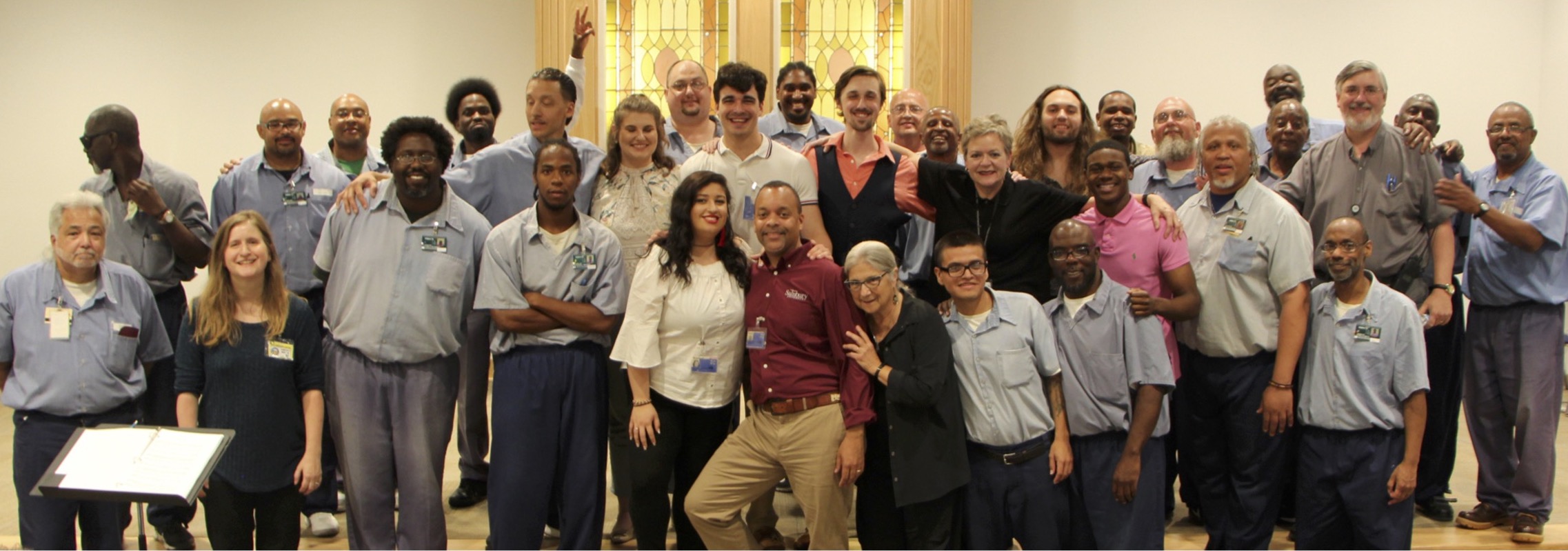(Written for the International Choral Bulletin of the International Federation of Choral Music)
I was asked to write about inclusion. It is impossible to overstate the importance of understanding our inconvenient assumptions that keep us from involving men and women who are incarcerated in the arts as well as in our lives. I am who I am today because of this work. I know what the benefits have been for me and as I share some of the responses from the men and women inside I hope to illustrate there is no better population to include as we revamp our thinking about music education and prepare conductors to go out into the world.
Over the last 31 years I have been privileged to teach academic courses and to build choirs inside a number of prisons in southwestern and central Ohio. In the early 1990s, when I was on the music faculty at Wilmington College, a Quaker school, the Dean of Correctional Education asked me to start a chorus as part of our Fine Arts curriculum at Warren Correctional Institution for men. In 1993 I founded UMOJA Men’s Chorus with seventeen singers and continued to conduct that choir until 2016.
UMO JA was the first chorus of its kind in the nation, although now, prison choirs led by outside choral professionals have become more common. To date, I have founded two other men’s choirs in addition to UMOJA: UBUNTU Men’s Chorus at London Correctional (2012) and KUJI Men’s Chorus at Marion Correctional (2016), and a women’s choir, HOPE Thru Harmony, at Dayton Correctional Institution (2014). This work has changed my life.
People who are incarcerated must be included in our world of music making. Though these singers are imprisoned, they are creative human beings, with open hearts and minds receptive to learning, growing and changing. Working with these men and women has allowed me to challenge my stereotypes and assumptions about who is incarcerated. My singers inside would agree that the transformative power of music and choral communities encourages spiritual and emotional development, fosters artistic expression, and teaches how to build community and cooperation.
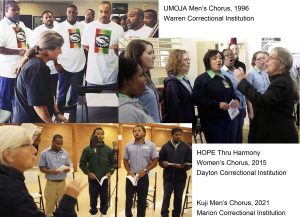
This work has been important to me in several ways including my self-interested desire to further my own education—about race, racism, poverty, mass incarceration, about the prison industrial complex that touches all of us, and about what happens to human beings in this devastating and singular culture of punishment our country has perfected.
I never thought I would say that some of my most profound musical experiences have happened inside prison walls. Over these many years I brought in everyone I knew — voice coaches, composers, musicologists, historians, hundreds of singers in other choruses I conduct, and as men and women have gotten out of prison, I have included these singers in my ensembles. The inclusion of returning citizens in my church choir and in my community choirs has enriched everyone. Cross cultural exchange happens and communities are built as musicians from the outside go inside prisons and when formerly incarcerated singers join choruses I conduct on the outside upon release. This is vital to our understanding of the resilience of imprisoned musicians and how the arts are the connector point to self -expression and to emotional healing.
When I began, I focused my repertoire selection primarily on music of African American composers and arrangers, and music from the African diaspora because the majority of singers who participated are African American. I brought in choral professionals and composers to teach their works. Soon we were singing compositions the men composed themselves. I was familiar with genres used by the men early on such as gospel, ballads, rhythm and blues, and other popular styles. Then my eyes were opened to Hip Hop and rap, adding to my appreciation and understanding of culture and tradition. We programmed our choral concerts with a theme we crafted together, but never would I have guessed that powerful story telling from the musical theatre repertory and extended, narrated choral works would capture the deepest engagement with my inside singers.
My appreciation for the oral/aural tradition expanded and also added to my awareness of change needed in our music education system. My listening skills improved quantifiably as well as my appreciation of the power of a compositional process that allows marginalized and silenced voices to sound their truth. It made me take to heart the meaning of the Quincy Jones’ song….. “what good is a song if it doesn’t inspire, if it has no message to bring, if it cannot lift you higher…”
I’d like to share reflections written by women from MUSE, Cincinnati’s Women’s Choir’s Choir, a choir I founded in 1983. Members of MUSE went inside Warren Correctional in 2010 and joined UMOJA as they recorded the African-American Spiritual, “Sometimes I Feel Like A Motherless Child,” for a projected CD.
- This was one of the most spiritually inspired experiences … to be standing next to men that society has deemed “unworthy,” “bad people,” and to hear the hair raising, angelic, voices singing next to me brought tears of joy to my eyes. The bond was incredible, and I will forever be grateful for the experience.
- There is a real sense of transcendence when making music with people who are not free. You look at the faces of these men and wonder how they got here—if they will ever get out.
- It was moving to see incarcerated men in a setting so unlike what you see in the media. Expressive, passionate, creative. It was also heartbreaking.
- Going through security and making the walk to the room where we recorded triggered thoughts of how it must be to keep your humanity behind bars. Then we started singing together and the emotion and creativity poured out. I felt privileged to use music to send positive energy across all kinds of barriers and find that on the other side, people are more like me than not like me.
The next section of this essay includes reflections and responses from men and women who are incarcerated as they reflected on three recent programs we’ve done to illustrate the power of inclusion when inside and outside singers collaborate. I introduce this section with words by Guy Banks from KUJI as we worked to craft a mission statement for the choir:
“The KUJI Men’s Chorus serves the inside and outside community through musical art. Our ideas of healthy community, freedom, unification, and spirituality are reflected through our music and personal relationships with one another.”
Les Miserables
In 2017, my longtime tenor friend and voice professor, Dr. John Wright (Salisbury University) who has come into prison with me many times to work vocally with my various choirs, suggested that he bring six of his student voice majors from Salisbury to sing the lead parts of Les Miserables with UBUNTU and KUJI choirs singing the choruses at their respective institutions. Together we chose six songs the men would sing and John selected the necessary songs to tell the story in truncated form.
I prepared the choirs at London and Marion prior to John arriving with his students. After six hours of rehearsal together in each prison, we performed our abridged version of Les Mis before large audiences of combined inside and outside attendees. Here are some reflections by choir members:
- Les Mis has been an experience. It took me to a time not too long ago when family members were on this type of chain gang. Of course, they don’t use chains anymore, they have OPI (Ohio Prison Industries) now where they use slave labor. Guys work all day for pennies on the dollar. So I sing not only for me, but for the voices past, present and future. This song brought out a range of emotions (KUJI).
- So many men who were in the packed audience said that they had never experienced anything like this at all. People who have the hardest exterior were moved to tears by the songs and the emotions that filled the air. In all my 21 years in prison, never have I seen or felt the hearts of so many being affected. The power of the human spirit was on display that night. There was harmony, love and unity and learning and vulnerability (UBUNTU)
- The music was different than anything I’ve ever experienced. It opened my mind to a whole new world of expression. It was relatable, funny, heartfelt, serious, and weird. I had a wonderful time (UBUNTU).
- A week before our performance, I was erroneously and unceremoniously thrown in the hole under investigation. Although I know I’ve done no wrong, there was a sense of despair. The “Work Song” took on new meaning. I felt like my fellow choir members were at the barricade and I was unable to join the fight. I wanted my freedom. “Do You Hear the People Sing,” also took on new meaning. Humorously, I sang several of the Les Mis songs to inspire me and keep my sanity (UBUNTU)
- I have been involved with musical theatre from my teenage years but always as a violinist in the orchestra pit. This time, I got to experience it as a vocalist on stage. In this environment, it can be daunting to open up and show emotions that are evoked by the musical theatre style, however, surrounded by these wonderful people, I couldn’t hold myself back, they made us feel comfortable and special. (UBUNTU)
- In an environment where it is commonplace to be regarded as state property rather than people, it was absolutely refreshing to be treated like human beings (UBUNTU).
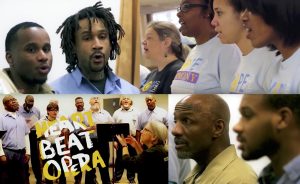
Heartbeat Opera’s production of Beethoven’s Fidelio, (2018)
Perhaps the quintessential example of inclusion was the invitation extended to all three of my Ohio choruses as well as three other prison choruses from Kansas, Minnesota and Iowa, to sing the “The Prisoner’s Chorus” from Beethoven’s only opera Fidelio.
Heartbeat Opera in New York City, a small repertory opera company, is known for reshaping classical literature to engage contemporary issues. Fidelio, for example, was transformed and reimagined for the era of Black Lives Matter. Directors Ethan Heard and Daniel Schlosberg came into the prisons, recorded, and videotaped rehearsals and stitched the material together. The video was then projected onto the back wall of the theatre during the live performance. “The most powerful scene was the prisoners’ chorus, which was performed by 100 incarcerated men and women and 70 volunteers from six prison choirs. They were seen on pre-recorded video as well as heard, and their amateur but committed music-making brought real life into the theatre.” The Wall Street Journal, May 7, 2018, by Heidi Waleson
- Singing The Prisoner’s Chorus feels like I am telling a part of my own story through theirs. I try to put myself in that moment and transfer that energy and emotion through my voice (UBUNTU)
- I’ve not been introduced to anything of this magnitude before. It’s like I went from a cheeseburger to the best quality of steak. Being included makes me feel validated as a human, as a woman, as a being with emotions, flaws and imperfections (HOPE Thru Harmony)
- Fidelio, to me, is a story of a man buried in the prison system. The only one worried about him is his wife. As someone who has been buried and forgotten in this system it offers light to one of the positive programs in the penal system, and brings us to consciousness for people who might never think of us otherwise (UBUNTU).
When asked what it was like to learn the music in German, one choir member said:
- When love is the foundation it transcends language. The German language became my language, even if just for a moment. Singing this music spoke to my present condition and what my family goes through to share love. KUJI is a family in an environment that doesn’t teach family (KUJI)
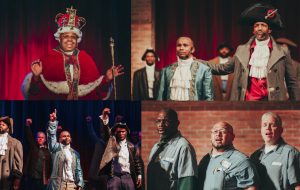
The Hamilton Project
After performing Les Mis , the men in KUJI Men’s Chorus felt so good about their success, they became excited about the possibility of doing Hamilton… and it happened.
The men chose 23 of the 46 songs, the accompaniment was available on line. The singers more or less fell into or chose the roles they would play. Seven women from my choirs outside joined KUJI, three played major roles (Eliza, Angelica and Peggy) and the others added to the chorus.
This was one of the most life-giving, mind-expanding programs I have ever done. We performed four sold-out programs with 700 outside guests, including family members in November 2019.
After the performance, a selection of the KUJI and audience members wrote these reflections:
- I don’t possess monetary wealth, but I have vision, intelligence and talent that I am supposed to be using to bring integrity into this world for the next generations. My legacy will consist of what I do for others. I also realize I must find balance between family and passion. Alexander Hamilton missed that opportunity, and I can learn from his experience. (KUJI)
- We often say that inmates are our harshest critics, but they pale compared to the COs [correctional officers], who are normally a stand offish and detached ilk, I was privy to conversations with COs and cast members after the performance, interestingly initiated by COs, that included, “I had no idea you guys were that talented, you crushed it. I was glad I saw it twice.” (KUJI)
- This was my first experience inside a prison. The aggressive inertness of that vast building, surrounded by chain link and barbed wire, staffed by impassive personnel was overwhelming to me at times. The men in the cast soared out of there on the wings of the stories of the founding fathers and mothers. I am forever changed and grateful. [Outside audience member]
- This musical displayed the marred, but still amazing beautiful American core. It showed how, even in all its flaws, America is about fight, freedom, growth, and change—all these beautiful things. (Incarcerated audience member]
- Never could I have imagined the impact that the Hamilton Project would have on my kith and kin and all who came to invest their time with us. I’m absolutely speechless. If only for 85-minutes of my life, I was no longer “civilly dead,” I can proudly say, with my head up and my shoulders back—that I was an addition to my community.” (KUJI)
I believe in an expansive music education system that crosses imagined chasms to include musical artists inside as well as those who have been released.
I believe music is the currency of hope and resilience. In the carceral setting, this was my experience born out every rehearsal and every performance. In this dark, desolate, and isolating environment, inclusion is the means for a moment of transcendence and freedom.
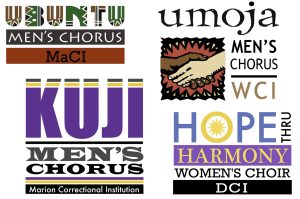
- Building Choral Communities Behind Prison Walls - January 24, 2022
- Federal Relief Options – Update 1/23/21 - January 26, 2021
- Transgender Voices Festival – Minnesota Style! - June 26, 2018

